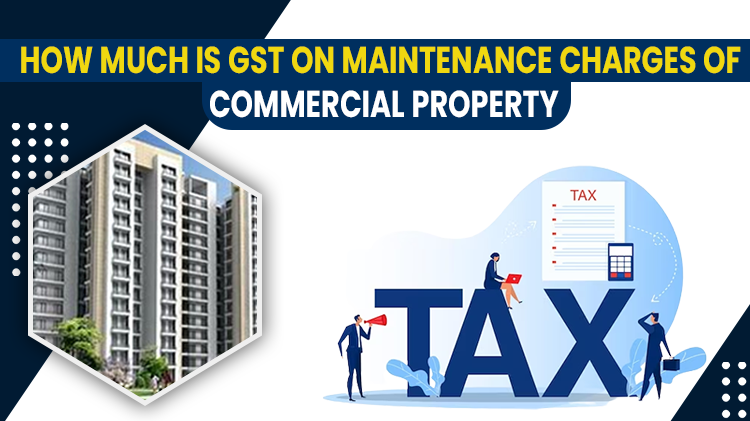Table of Contents
When buying, renting, or maintaining a commercial property, it’s important to take into account a variety of maintenance charges. The Goods and Services Tax (GST) that is imposed on maintenance fees is one important factor. It’s essential for both landlords and tenants to understand how the GST will affect maintenance fees. In order to give you more insight on the topic, we will go into detail in this blog about how GST applies to maintenance fees for commercial buildings.
What are Maintenance Charges?
Property owners or tenants must pay maintenance fees to cover the costs of managing and maintaining the common areas, amenities, and services in a commercial property. These fees are often collected by the maintenance or property management company and are used to pay for different costs related to the property’s maintenance.
Depending on the property and the agreement between the landlord and renters, different services and costs may be included in maintenance fees. However, a few frequent expenses that are paid for through maintenance fees are as follows:
- Security: This includes expenses for keeping up security guards, surveillance equipment, access control systems, and other security precautions to protect the building and its occupants.
- Cleaning: Regular cleaning services for public spaces including lobbies, corridors, parking lots, and restrooms are frequently included in maintenance fees.
- Repairs and maintenance: These fees are intended to pay for the necessary upkeep and repairs to keep the property in good shape. This include repairing any damages, taking care of any plumbing or electrical concerns, maintaining amenities in the common areas, and ensuring that tools and systems are in good working order.
- Lawn care, tree trimming, pest management, and general maintenance of shared outdoor spaces may be included in the cost of maintaining the landscaping, gardens, and outside areas of the property.
- Utilities: The cost of utilities such as power, water, heating, and cooling for communal areas might be included in maintenance fees.
- Administrative costs: These fees pay for the overhead costs paid by the company providing property management or maintenance services, including employee wages, accounting, and legal fees.
Overview of Goods and Services Tax (GST):
India has implemented a comprehensive indirect tax known as GST on the sale of goods and services. It streamlined the taxation system by replacing different indirect taxes like the VAT, service tax, and excise duty. Depending on the kind of transaction and the applicable jurisdiction, GST is divided into Central GST (CGST), State GST (SGST), or Union Territory GST (UTGST).
A single indirect tax system called the Goods and Services Tax (GST) was put into place in India on July 1, 2017. The Value Added Tax (VAT), service tax, excise duty, and other indirect taxes levied by the federal and state governments were all replaced by this one.
The value added at each stage of the supply chain is taxed under the GST system, which classifies products and services as taxable supplies. Due to the fact that it is a destination-based tax, it is gathered at the point of consumption or sale.
GST is split into two primary parts in order to administer it effectively:
- GST (Central GST): It is the portion of GST that the federal government imposes on the exchange of goods and services between states. The Central Government receives the CGST revenue.
- State GST (SGST) or Union Territory GST (UTGST): These GST components are imposed on intra-state deliveries of goods and services by the State Government or Union Territory Administration. The revenue collected as SGST or UTGST remains with the respective state or union territory.
- The Integrated GST (IGST) is charged on interstate supplies of goods and services. The Central Government collects IGST, which is made up of both CGST and SGST/UTGST. It guarantees smooth credit movement between states and prevents the complications of different taxes.
Applicability of GST on Maintenance Charges:
Maintenance fees for commercial premises are subject to GST. Any service supply made for payment is subject to GST, per the regulations governing it. Maintenance services are included by GST because they entail providing a variety of services for a price.
Understanding Taxable and Non-taxable Components of Maintenance Charges:
Usually, maintenance fees have both taxable and non-taxable parts. Services including security, maintenance, repairs, and electricity costs are examples of taxable components. Statutory fees, sinking fund payments, property taxes, and any other fees expressly exempt from GST may all be considered non-taxable components.
GST Rate on Maintenance Fees:
The type of services offered will determine the appropriate GST rate on maintenance fees. The GST rate is now 18% for the majority of maintenance services, such as cleaning, repairs, and security. However, it is crucial to confirm the precise services and costs that the government authorities have set.
Calculation of GST on Maintenance Charges:
The taxable amount is multiplied by the relevant GST rate to determine the GST on maintenance fees. The GST cost would be Rs. 1,800 (Rs. 10,000 * 18%) if the maintenance fees total Rs. 10,000 and the applicable GST rate is 18%.
Input Tax Credit (ITC) on Maintenance Charges:
Maintenance service providers may claim an input tax credit (ITC) for the GST they paid on the supplies and equipment used in performing maintenance services. Their entire tax liability is decreased as a result. However, in accordance with GST legislation, ITC is subject to particular restrictions and documentation needs.
GST Registration for Maintenance Service Providers:
If a maintenance service provider’s annual revenue reaches the set threshold, they must register for GST. They can collect and remit GST on maintenance fees and make ITC claims thanks to their GST registration.
Impact of GST on Commercial Property Owners:
The effects of GST on commercial property owners include the obligation to collect and pay GST on maintenance fees to the government. They have to make sure that GST laws are followed, keep accurate records, send out GST invoices, and submit frequent GST reports.
Impact of GST on Commercial Property Tenants:
As stipulated in their lease agreements, commercial property tenants are required to pay GST on maintenance fees. They should make sure the property owner or provider of maintenance services is in compliance with the GST and factor this into their financial planning.
GST Invoice and Documentation for Maintenance Charges:
Property owners or tenants must get GST-compliant invoices from maintenance service providers for the fees they have paid. Important information including the GSTIN (GST Identification Number), a description of the services, the taxable amount, the applicable GST rate, and the GST amount should be included on the invoices.
Legal Aspects and Rulings on GST and Maintenance Charges:
Owners of commercial real estate and companies that perform maintenance services are required to abide by GST laws, which include timely filing of GST returns, payment of GST liabilities, and keeping of pertinent records and documents. Punishments and legal repercussions may result from non-compliance.
The applicability and interpretation of the GST on maintenance expenses are governed by a number of legal considerations and judicial judgements. When dealing with intricate GST issues, it is critical to stay current on the most recent legal changes and to seek professional counsel.
Challenges and Common Issues Faced with GST on Maintenance Charges:
The implementation of GST on maintenance fees may be complicated by concerns including figuring out the proper GST rate for certain services, managing input tax credits, and resolving disagreements or problems with GST compliance.
Important Points to Consider for Commercial Property Owners and Tenants:
To minimise misunderstandings or disputes, commercial property owners and tenants should discuss issues such GST consequences during lease negotiations, the clarity of maintenance charge terms, shared awareness of GST responsibilities, and documentation needs.
Recommendations for Smooth GST Compliance on Maintenance Charges:
In order to ensure smooth GST compliance, property owners and maintenance service providers should keep accurate records, seek professional advice, stay current on GST regulations, conduct routine audits, and address any non-compliance right away.
Future Outlook and Updates on GST for Maintenance Charges:
Based on governmental objectives and economic factors, GST legislation and rates may be updated. It is crucial to keep up with any upcoming developments and amendments pertaining to GST on maintenance fees.
GST and Commercial Property Maintenance Charges: Expert Opinions and Industry Perspectives
On the real-world effects of GST on maintenance fees, experts and business people can offer insightful and unique opinions. Their insights can facilitate financial planning and aid in navigating the intricacies of GST compliance.
Conclusion: Ensuring GST Compliance for Maintenance Charges
Commercial property owners and tenants must be aware of the complexities of GST on maintenance fees in order to meet their tax requirements, efficiently control expenditures, and maintain compliance with GST laws. Stakeholders may negotiate the complexity of GST and contribute to a seamless and transparent taxing system for commercial property maintenance fees by remaining educated, seeking competent guidance, and maintaining adequate paperwork.
Also Read:
FAQs
1. Do maintenance costs for commercial properties fall inside the scope of the GST?
Yes, maintenance fees for commercial property are subject to GST.
2. What is the GST rate for commercial property maintenance fees?
The current GST rate for maintenance fees for commercial real estate is 18%.
3. Is GST applied to the whole amount of maintenance fees?
Yes, GST is applied to the whole amount of maintenance fees.
4. Who is in responsibility of gathering and sending the GST on maintenance fees?
GST on maintenance fees must be collected and submitted by the company providing property management or maintenance services.
5. Is it possible for the property owner to claim an input tax credit (ITC) for the GST paid on maintenance fees?
If the property owner is registered for GST, they may claim an input tax credit for the GST paid on maintenance fees.
6. Does the GST apply to maintenance fees for individual units as well as communal areas?
Both maintenance fees for individual units and shared areas are subject to GST.
7. Are there any GST thresholds or exclusions for maintenance fees?
No, there are no GST thresholds or exemptions for maintenance fees. It is applicable no matter how much.
8. Should GST be added to the whole cost of maintenance fees or can it be charged separately?
Maintenance fees should be listed as a separate line item in the invoice or bill and paid separately for GST.
9. Do maintenance fees for residential properties fall under the scope of the GST?
No, maintenance fees for residential properties are not subject to GST. Only commercial properties are covered.
10. How frequently should maintenance fees be subject to GST?
The regular monthly or quarterly GST filing and payment schedule should be followed for the GST on maintenance fees.
11. Is it possible to pay maintenance fees with installments of GST?
Yes, as long as the installment payments follow the GST reporting and payment schedule, GST on maintenance fees may be paid in installments.
12. What paperwork is needed for GST on maintenance fees?
The provider of property management or maintenance services must submit a GST-compliant invoice or bill for the maintenance fees that specifically states the GST amount.
13. Can the tenant or property owner request a GST return for maintenance costs?
Only when the input tax credit exceeds the output tax obligation of the property owner or tenant may a GST refund be requested. Otherwise, there will be no refund.
14. Can maintenance fee arrears be subject to GST?
Yes, whether they are for current or past periods, maintenance fee arrears may be subject to GST.
15. Do late fees or penalties for maintenance costs fall under the scope of the GST?
Yes, fines or late fees imposed on maintenance costs are subject to GST.
16. Can interest on unpaid maintenance fees that has accrued be subject to GST?
No, interest accumulated on overdue maintenance fees is not subject to GST.
17. Can one-time special assessments or levies for property improvements be subject to GST?
Yes, as long as they qualify as maintenance fees, one-time special assessments or levies for property upgrades may be subject to GST.
18. Are maintenance fees that include GST allowable as a cost for property owners or tenants?
Yes, for GST-registered enterprises, property owners or tenants may deduct GST on maintenance fees as an expense.
19. Can the provider of property management or maintenance services claim GST paid on maintenance-related expenses?
Yes, the provider of property management or maintenance services may claim an input tax credit for GST paid on maintenance-related expenses.l
20. Is a GST invoice for maintenance fees from the property management or maintenance service provider required?
Yes, it is necessary for the company providing property management or maintenance services to provide a GST invoice that complies with the GST regulations and specifically states the GST amount.



